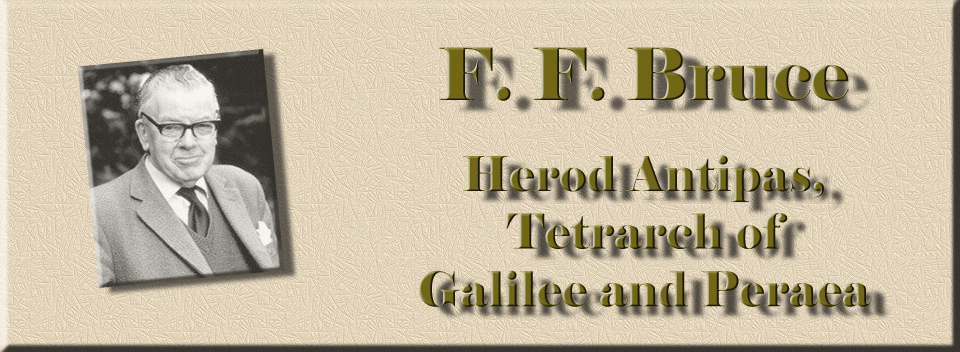
Herod Antipas, Tetrarch of Galilee and Peraea
By Frederick Fyvie Bruce
Chapter 4
Luke’s accurate and relatively abundant knowledge about the Herod family may be due to his acquaintance with certain people who had fairly close contact with the family. He mentions Joanna, the wife of one of Antipas’s stewards, among the well-to-do women who supported Jesus and his disciples during their itinerant ministry;37 more important in the present connexion is his reference to ‘Manaen, sÚntrofoj of Herod the tetrarch’, as one of the leading teachers and prophets in the church of Syrian Antioch about A.D. 47.38 Whatever sÚntrofoj means here ‘foster-brother’ or, more generally, ‘companion’ or ‘courtier―Luke., who is recorded as being himself an Antiochene,39 must have found in Manaen a valuable informant on the contacts of Antipas and his relatives with the early Christian story.One minor piece of information which Luke preserves is that on one occasion Jesus was warned by some friendly Pharisees to get out of Antipas’s tetrarchy: ‘You should leave this place and go on your way; Herod is out to kill you.’ He replied: ‘Go and tell that fox, “Listen: today and tomorrow I shall be casting out demons and working cures; on the third day I reach my goal.” However, I must be on my way today and tomorrow and the next day, because it is unthinkable for a prophet to meet his death anywhere but in Jerusalem.’40 This last remark may seem strange, in view of the recent beheading of John the Baptist, acknowledged by Jesus himself to be a prophet and more than a prophet, miles away, from Jerusalem and Judaea. But there is characteristic irony in Jesus’ words: he knew himself immune from death until his work was done, and when his work was done, it would not be in Antipas’s territory that he would die.
Nevertheless, that Antipas should threaten Jesus’s life is not surprising. If John the Baptist’s activity had caused him disquiet, the proclamation of a new kingdom by Jesus and his disciples must have been more disturbing. ‘I beheaded John’, said Antipas, ‘but who is this?’41 He had solid ground for being disturbed and wishing to see this new prophet, for when Jesus sent the twelve apostles two by two through the towns and villages of Galilee, they apparently acted with more zeal than discretion as they announced the advent of the divine kingdom; and when they came back to Jesus to report on their mission, he immediately took them across to the east side of the Lake of Galilee, out of Antipas’s jurisdiction.42 But they were followed there by crowds of excited Galilaeans in militant mood who tried to compel Jesus to become their king and lead them against Rome and Rome’s allies. It was with much ado that Jests convinced them that he was not minded to be the kind of king they wanted;43 but more than enough had been done to excite Antipas’s suspicions against him.
Nor is it surprising to find the ‘Herodians’ pursuing a hostile policy towards Jesus both in Galilee and in Jerusalem. Who precisely the Herodians were is a matter of some dispute, but the most reasonable view is that they were the political partisans of the Herod dynasty (especially of Antipas himself) who promoted the interests of the dynasty in Palestine and hoped to see the whole country brought back under the administration of one of its members―and why not of Antipas himself?―as it had been in the days of Herod the Great. On two occasions Mark tells how Herodians and Pharisees cooperated in an unlikely coalition against Jesus;44 it is in line with this that once, during a crossing of the Lake, he is said to have warned his disciples against ‘the leaven of the Pharisees and the leaven of Herod (or, of the Herodians)’.45
However, neither Antipas nor his partisans succeeded in laying hands on Jesus; only once did Antipas have a brief opportunity of seeing him.
37 Luke viii 3.
38 Acts xiii 1. It has been conjectured that he was the grandson of the Essene Manaen (Menahem) honoured byHerod the Great (Ant. xv 373 ff.).
39 Anti-Marcionite Prologue to the Gospel of Luke.
40 Luke xiii 31-33.
41 Luke ix 9; cf. Mark vi 16.
42 Mark vi 7 ff., 30 ff. Cf. H. W. MONTEFIORE, ‘Revolt in the Desert?’ NTS viii, 1961-62, pp. 135 ff.
43 John vi 14 ff.
44 Mark iii 6; xii 13.
45 Mark viii 15. Both readings are found; ‘Herodians’ has the support of P45.
To display the Greek & Hebrew words in this article you will need the BibleWorks Greek and Hebrew fonts for Windows
Original files can be downloaded from http://www.biblicalstudies.org.uk/
-
Site Navigation
 Home
Home What's New
What's New Bible
Bible Photos
Photos Hiking
Hiking E-Books
E-Books Genealogy
Genealogy Profile
Free Plug-ins You May Need
Profile
Free Plug-ins You May Need
 Get Java
Get Java.png) Get Flash
Get Flash Get 7-Zip
Get 7-Zip Get Acrobat Reader
Get Acrobat Reader Get TheWORD
Get TheWORD